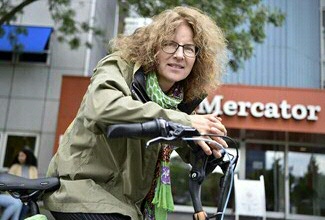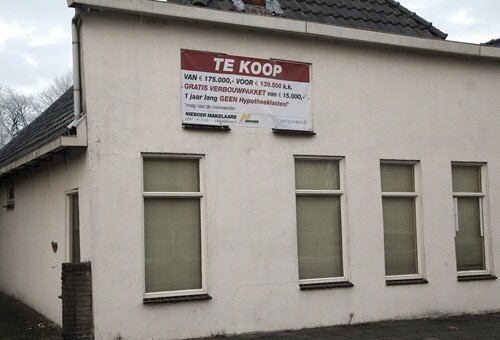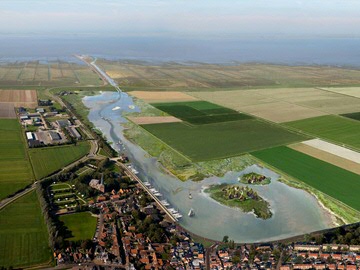The fight against village shrinkage

Tialda Haartsen arrives at our meeting on her e-bike, having cycled from Eenrum. ‘I lived in the city for a while but the countryside lured me back. And Eenrum is a lively village with plenty of amenities.’ Haartsen should know. As a researcher of rural depopulation, she has plenty of reference material. In the bog of village shrinkage, beautiful flowers occasionally blossom unexpectedly.
Text: Martin Althof, Communication UG / Photo: Elmer Spaargaren
Many people, especially young people, are leaving the villages in the Dutch countryside behind. There are few employment opportunities to speak of and supermarkets and schools are disappearing. Haartsen: ‘Village shrinkage invariably means a loss and has negative connotations. But sometimes, new and surprising initiatives emerge in these circumstances, such as the “Holwerd aan Zee” project: a large-scale intervention in the countryside that will breathe new life into a village that has suffered from population decline.’
No losers
The perception is that virtually all young people leave villages in areas facing depopulation and that only the underprivileged, the “losers”, are left behind. However, the situation appears to be more nuanced. Haartsen explains: ‘Of course some people do move away, at least temporarily, to go to university or college. But it’s always been like that. About 60% to 70% of young people stay behind, which is much more than most people think. Inhabitants have a strong bond with the place where they were born and raised. Usually, they don’t plan on leaving.’

Distance and accessibility
Low birth rates and negative net migration are undisputable causes of shrinkage and dwindling amenities in many villages. The economic situation and changing consumer behaviour also play a role. Haartsen is trying to share knowledge and find solutions to this problem in collaboration with Kenniscentrum Krimp Noord-Nederland (the knowledge network for population decline in the Northern Netherlands). Haartsen: ‘Distance and accessibility are essential. Fast internet has already improved things a lot, but upgrading roads and railways also opens doors. Much faster (electric) bicycles are making some villages more attractive to live in. The key factor, however, is having a dynamic approach to infrastructure. After the reconstruction of the motorway between Eenrum and Groningen, the narrow cycle paths simply reverted to their previous state, full of tree roots. Such a missed opportunity!’
Shifting boundaries
Which villages, in which areas, are susceptible to shrinkage? Which villages are able to maintain their population and amenities? Areas within a city’s sphere of influence often do better than villages further away, but with better connections, the boundaries are slowly shifting. Haartsen: ‘For problem areas, you have to look for other solutions, for example, encouraging the business community to get more involved in education. Young people can do internships to discover employment opportunities in the region. This has gone down particularly well in East Groningen. Sometimes, these areas can also benefit from the knowledge, skills and money of those who once left the area. After all, your bond with your home town never goes away. Some professors originally from Oude Pekela, for example, are actively involved in the future of that area.’
It’s taking too long
Like many Groningers, Haartsen is very angry about the situation in the earthquake zone and about the government’s reaction: ‘This area was already struggling and then we got the earthquakes on top of that. You can’t just tell people to go and live somewhere else. People have their roots in that area, their whole life is there. The victims can barely manage, it’s too complicated.’ Haartsen notes that in the Netherlands there is a degree of solidarity with the people in Groningen’s earthquake zone. ‘But that solidarity declines sharply as you get further away from the area, as well as over time. It’s simply taking too long.’

Taking control
Haartsen becomes wildly enthusiastic when she talks about the initiative of four men from Holwerd, in Northern Friesland. They propose breaking through the dike near their village, which was built on a mound, in order to reconnect it with the sea: “Holwerd aan Zee” (“Holwerd on Sea”). Haartsen wrote about this in a blog post for the University of Groningen website entitled ‘In Holwerd aan Zee is de new Lely opgestaan’ (‘Holwerd aan Zee is the new Lely’). ‘I think it’s a great idea. It offers perspective to the shrinking village of Holwerd; it’s visionary, was conceived by committed citizens and is partly self-financed. And it’s in keeping with discussions in urban and regional planning about no longer fighting against water, but rather allowing the sea to enter in a controlled way. I urge the central government to embrace and finance this initiative. We need this kind of daring investment in the 21st century, especially in the north of the Netherlands!’
More news
-
01 December 2025
The power of movement
